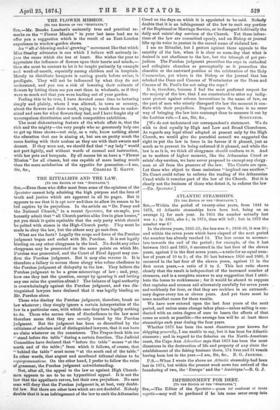THE RITUALISTS AND THE LAW.
(TO THE EDITOR OF THE " SPECTATOR.") SIR,—Even those who differ most from some of the opinions of the Spectator cannot help admiring the high purpose and the love of truth and justice which are apparent in all its pages. But it 'appears to me that it is apt now and then to allow its reason to be led captive by its prejudices. In the article on " Dr. Pusey and the National Church," in a recent Spectator, for example, you honestly admit that " all Church parties alike live in glass houses," yet you think it quite equitable that the only party which should be pelted with stones is the High-Church party. They must be made to obey the law, but the others may go scot-free.
What are the facts? Legally the scope and force of the Purchas judgment began and ended with Mr. Purchas. It is not legally binding on any other clergyman in the land. No doubt any other elergyman may be prosecuted on the same points on which Mr. Purchas was prosecuted, and the Court of Final Appeal may con- Erin the Purchas judgment. But it may also reverse it. It is -therefore a fallacy to accuse those clergy who refuse obedience to the Purchas judgment of disloyalty to the law. They believe the Purchas judgment to be a gross miscarriage of law ; and, pray, bow can they test the question, except by ignoring it and letting any one raise the question afresh? The balance of legal authority is overwhelmingly against the Purchas judgment, and two dis- tinguished lawyers have declared that it was legally binding on Mr. Parches alone.
Those who disobey the Purchas judgment, therefore, break no
law whatever ; they simply ignore a certain interpretation of the law in a particular case, with which case they have legally nothing to do. Those who accuse them of disobedience to the law must therefore mean that they are morally bound by the Purchas judgment. But the judgment has been so discredited by the criticisms of scholars and of distinguished lawyers, that it can have no claim whatever on the conscience. The Prayer-book bids me "stand before the table " during a certain function. The Judicial Committee have declared that " before the table" means "at the north end of the table ;" from which it follows, of course, that " behind the table " must mean " at the south end of the table." In other words, that august and moribund tribunal claims to be supergrammaticus. On the other hand, I prefer to follow the rules of grammar, the Purchas judgment notwithstanding.
But, after all, the appeal to the law as against High Church- men appears to me to be an hypocritical appeal. It is not the law that the appellants revere, but their own prejudices. No sane man will deny that the Purchas judgment is, at best, very doubt- ful law. But there are other laws which are not doubtful. Nobody doubts that it is an infringement of the law to omit the Athanasian Creed on the days on which it is appointed to be said. Nobody doubts that it is an infringement of the law to omit any portion of the Baptismal or Marriage Service, or to disregard habitually the daily and saints'-day services of the Church. Yet these infrac- tions of the law are committed openly, and no Bishop or journal lifts up its voice to protest in the sacred name of violated law.
I am no Ritualist, but I protest against these appeals to the sanctity of the law, when it is clear as noon-day that what is desired is not obedience to the law, but the triumph of pet pre- judices. The Purchas judgment prescribes the cope in cathedral and collegiate churches as peremptorily as it proscribes the chasuble or the eastward position at the celebration of the Holy Communion, yet where is the Bishop or the journal that has rebuked the Dean and Canons of Westminster or the Dean and Canons of St. Paul's for not using the cope ?
It is, therefore, because I feel the most profound respect for the majesty of the law, that I am constrained to utter my indig- nant protest against solemn invocations in the name of law, on the part of men who utterly disregard the law the moment it con- flicts with their prejudices. Depend upon it, there is no surer way of bringing the law into contempt than to measure it out by the Lesbian rule.—I am, Sir, &c., SCRIITATOR.
[We do not understand our correspondent's statement. We do wish to deal equally by High and Low and Broad Churchmen. As regards any legal ritual adopted at present only by the High Church, we would give the parochial council we suggested the right to put the law in force in its favour if it pleased, just as much as to prevent its being enforced if it pleased, and while the law is as it is, we think all clergymen should conform to it. And as to matters of higher moment, like the Athanasian Creed or saints'-day services, we have never proposed to exempt any clergy- man at all from the pressure of the law. The Courts are open. Let those who object to these omissions " implead one another." No Court could refuse to enforce the reading of the Athanasian Creed while it remains part of the law of the Church. But it is clearly not the business of those who detest it, to enforce the law —E D . Spectator.]


































 Previous page
Previous page